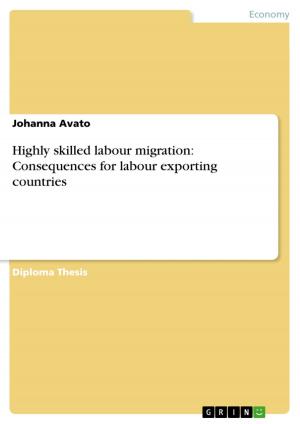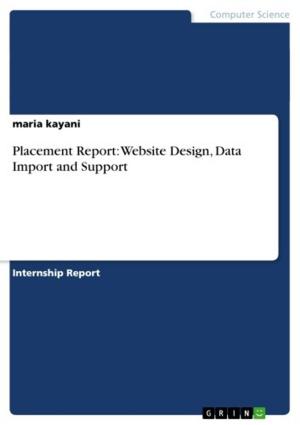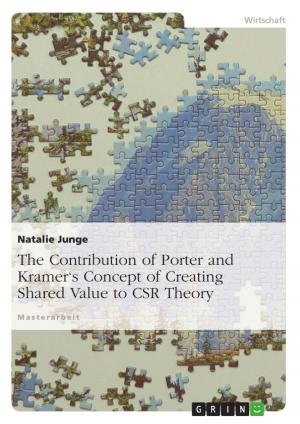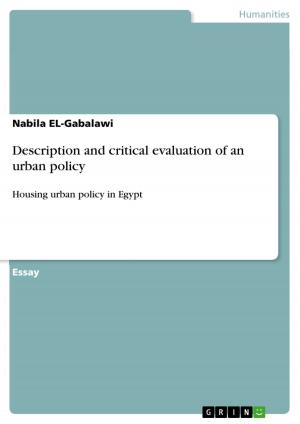MBA-Programmes and MBA-Students of Kannur University (India) and Riedlingen University (Germany)
Career expectations and job opportunities
Business & Finance, Management & Leadership, Operations Research| Author: | Chantal Maichel | ISBN: | 9783640590483 |
| Publisher: | GRIN Publishing | Publication: | April 13, 2010 |
| Imprint: | GRIN Publishing | Language: | English |
| Author: | Chantal Maichel |
| ISBN: | 9783640590483 |
| Publisher: | GRIN Publishing |
| Publication: | April 13, 2010 |
| Imprint: | GRIN Publishing |
| Language: | English |
Research Paper (undergraduate) from the year 2009 in the subject Business economics - Operations Research, grade: 2,0, University of Applied Sciences Riedlingen, language: English, abstract: One of the most important aims of Europe for a standardization and transparency of education was claimed by the Sorbonne Declaration in 1998 and concretised and expended through the Bologna Process. This process purposes three main aims: the promotion of mobility, international competitiveness, international employability. The Department of Education of the 27 European Nations concluded the implementation of a consecutive, two stage graduation system called 'bachelor' and 'master'. In global thinking standardization and therefore comparability is getting more and more important. 2006 an overall of 22,300 international students in Germany reached a graduation and qualified them to get a profession in Germany. Not only the education system in Germany is getting more and more international, also the companies are rising for the global market. In the near past German companies zoomed into the growing market of China, but recently India is increasing its importance. With a GNP of 1,098,945 million USD and in real terms a market growth over 13.6% the Indian market is coming into view of many German companies like Bosch, SAP or Deutsche Bank which enlarge their activities to India. At the other side more and more Indian companies settle down in Germany or even buy German companies. In this context not only the impact of an international education in India and Germany is getting more important, also the partnership between Indian and German universities. For this reasons the Riedlingen University (Germany, Baden Wuerttemberg) and the Kannur University (India, Kerala) have built a partnership with an exchange programme for the respective students. Within this exchange programme the students as well as the professors have the chance to get to know the other educational institutions, culture, country; the different way of life. The aim oft the present study is to get a general overview of the differences and the similarities between the Indian and German students and the MBA programmes. As a further step the following career expectations of the students will be analysed.
Research Paper (undergraduate) from the year 2009 in the subject Business economics - Operations Research, grade: 2,0, University of Applied Sciences Riedlingen, language: English, abstract: One of the most important aims of Europe for a standardization and transparency of education was claimed by the Sorbonne Declaration in 1998 and concretised and expended through the Bologna Process. This process purposes three main aims: the promotion of mobility, international competitiveness, international employability. The Department of Education of the 27 European Nations concluded the implementation of a consecutive, two stage graduation system called 'bachelor' and 'master'. In global thinking standardization and therefore comparability is getting more and more important. 2006 an overall of 22,300 international students in Germany reached a graduation and qualified them to get a profession in Germany. Not only the education system in Germany is getting more and more international, also the companies are rising for the global market. In the near past German companies zoomed into the growing market of China, but recently India is increasing its importance. With a GNP of 1,098,945 million USD and in real terms a market growth over 13.6% the Indian market is coming into view of many German companies like Bosch, SAP or Deutsche Bank which enlarge their activities to India. At the other side more and more Indian companies settle down in Germany or even buy German companies. In this context not only the impact of an international education in India and Germany is getting more important, also the partnership between Indian and German universities. For this reasons the Riedlingen University (Germany, Baden Wuerttemberg) and the Kannur University (India, Kerala) have built a partnership with an exchange programme for the respective students. Within this exchange programme the students as well as the professors have the chance to get to know the other educational institutions, culture, country; the different way of life. The aim oft the present study is to get a general overview of the differences and the similarities between the Indian and German students and the MBA programmes. As a further step the following career expectations of the students will be analysed.















